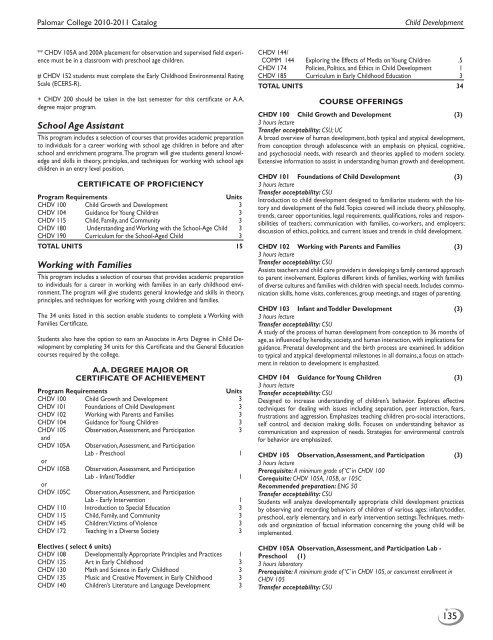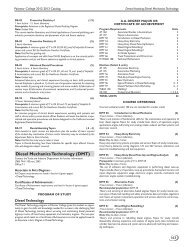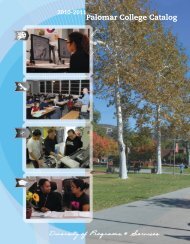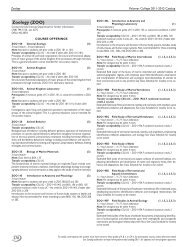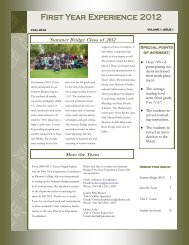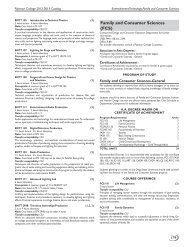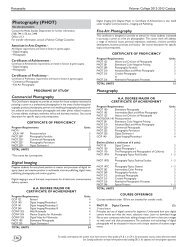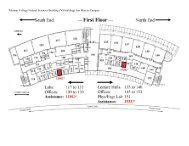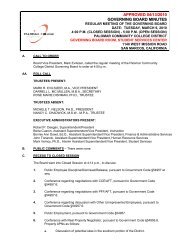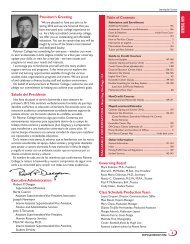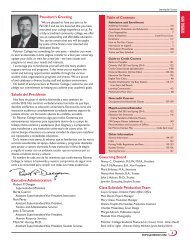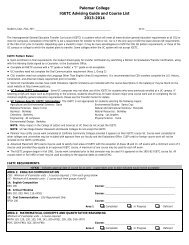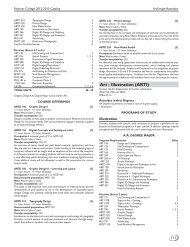Download the complete catalog - Palomar College
Download the complete catalog - Palomar College
Download the complete catalog - Palomar College
You also want an ePaper? Increase the reach of your titles
YUMPU automatically turns print PDFs into web optimized ePapers that Google loves.
<strong>Palomar</strong> <strong>College</strong> 2010-2011 Catalog<br />
Child Development<br />
** CHDV 105A and 200A placement for observation and supervised field experience<br />
must be in a classroom with preschool age children.<br />
# CHDV 152 students must <strong>complete</strong> <strong>the</strong> Early Childhood Environmental Rating<br />
Scale (ECERS-R).<br />
+ CHDV 200 should be taken in <strong>the</strong> last semester for this certificate or A.A.<br />
degree major program.<br />
School Age Assistant<br />
This program includes a selection of courses that provides academic preparation<br />
to individuals for a career working with school age children in before and after<br />
school and enrichment programs. The program will give students general knowledge<br />
and skills in <strong>the</strong>ory, principles, and techniques for working with school age<br />
children in an entry level position.<br />
certificate of proficiency<br />
Program Requirements<br />
Units<br />
CHDV 100 Child Growth and Development 3<br />
CHDV 104 Guidance for Young Children 3<br />
CHDV 115 Child, Family, and Community 3<br />
CHDV 180 Understanding and Working with <strong>the</strong> School-Age Child 3<br />
CHDV 190 Curriculum for <strong>the</strong> School-Aged Child 3<br />
TOTAL UNITS 15<br />
Working with Families<br />
This program includes a selection of courses that provides academic preparation<br />
to individuals for a career in working with families in an early childhood environment.<br />
The program will give students general knowledge and skills in <strong>the</strong>ory,<br />
principles, and techniques for working with young children and families.<br />
The 34 units listed in this section enable students to <strong>complete</strong> a Working with<br />
Families Certificate.<br />
Students also have <strong>the</strong> option to earn an Associate in Arts Degree in Child Development<br />
by completing 34 units for this Certificate and <strong>the</strong> General Education<br />
courses required by <strong>the</strong> college.<br />
A.A. Degree Major or<br />
Certificate of Achievement<br />
Program Requirements<br />
Units<br />
CHDV 100 Child Growth and Development 3<br />
CHDV 101 Foundations of Child Development 3<br />
CHDV 102 Working with Parents and Families 3<br />
CHDV 104 Guidance for Young Children 3<br />
CHDV 105 Observation, Assessment, and Participation 3<br />
and<br />
CHDV 105A<br />
or<br />
CHDV 105B<br />
or<br />
CHDV 105C<br />
Observation, Assessment, and Participation<br />
Lab - Preschool 1<br />
Observation, Assessment, and Participation<br />
Lab - Infant/Toddler 1<br />
Observation, Assessment, and Participation<br />
Lab - Early Intervention 1<br />
CHDV 110 Introduction to Special Education 3<br />
CHDV 115 Child, Family, and Community 3<br />
CHDV 145 Children: Victims of Violence 3<br />
CHDV 172 Teaching in a Diverse Society 3<br />
Electives ( select 6 units)<br />
CHDV 108 Developmentally Appropriate Principles and Practices 1<br />
CHDV 125 Art in Early Childhood 3<br />
CHDV 130 Math and Science in Early Childhood 3<br />
CHDV 135 Music and Creative Movement in Early Childhood 3<br />
CHDV 140 Children’s Literature and Language Development 3<br />
CHDV 144/<br />
COMM 144 Exploring <strong>the</strong> Effects of Media on Young Children .5<br />
CHDV 174 Policies, Politics, and Ethics in Child Development 1<br />
CHDV 185 Curriculum in Early Childhood Education 3<br />
TOTAL UNITS 34<br />
COURSE OFFERINGS<br />
CHDV 100 Child Growth and Development (3)<br />
3 hours lecture<br />
Transfer acceptability: CSU; UC<br />
A broad overview of human development, both typical and atypical development,<br />
from conception through adolescence with an emphasis on physical, cognitive,<br />
and psychosocial needs, with research and <strong>the</strong>ories applied to modern society.<br />
Extensive information to assist in understanding human growth and development.<br />
CHDV 101 Foundations of Child Development (3)<br />
3 hours lecture<br />
Transfer acceptability: CSU<br />
Introduction to child development designed to familiarize students with <strong>the</strong> history<br />
and development of <strong>the</strong> field. Topics covered will include <strong>the</strong>ory, philosophy,<br />
trends, career opportunities, legal requirements, qualifications, roles and responsibilities<br />
of teachers; communication with families, co-workers, and employers;<br />
discussion of ethics, politics, and current issues and trends in child development.<br />
CHDV 102 Working with Parents and Families (3)<br />
3 hours lecture<br />
Transfer acceptability: CSU<br />
Assists teachers and child care providers in developing a family centered approach<br />
to parent involvement. Explores different kinds of families, working with families<br />
of diverse cultures and families with children with special needs. Includes communication<br />
skills, home visits, conferences, group meetings, and stages of parenting.<br />
CHDV 103 Infant and Toddler Development (3)<br />
3 hours lecture<br />
Transfer acceptability: CSU<br />
A study of <strong>the</strong> process of human development from conception to 36 months of<br />
age, as influenced by heredity, society, and human interaction, with implications for<br />
guidance. Prenatal development and <strong>the</strong> birth process are examined. In addition<br />
to typical and atypical developmental milestones in all domains, a focus on attachment<br />
in relation to development is emphasized.<br />
CHDV 104 Guidance for Young Children (3)<br />
3 hours lecture<br />
Transfer acceptability: CSU<br />
Designed to increase understanding of children’s behavior. Explores effective<br />
techniques for dealing with issues including separation, peer interaction, fears,<br />
frustrations and aggression. Emphasizes teaching children pro-social interactions,<br />
self control, and decision making skills. Focuses on understanding behavior as<br />
communication and expression of needs. Strategies for environmental controls<br />
for behavior are emphasized.<br />
CHDV 105 Observation, Assessment, and Participation (3)<br />
3 hours lecture<br />
Prerequisite: A minimum grade of ‘C’ in CHDV 100<br />
Corequisite: CHDV 105A, 105B, or 105C<br />
Recommended preparation: ENG 50<br />
Transfer acceptability: CSU<br />
Students will analyze developmentally appropriate child development practices<br />
by observing and recording behaviors of children of various ages: infant/toddler,<br />
preschool, early elementary, and in early intervention settings.Techniques, methods<br />
and organization of factual information concerning <strong>the</strong> young child will be<br />
implemented.<br />
CHDV 105A Observation, Assessment, and Participation Lab -<br />
Preschool (1)<br />
3 hours laboratory<br />
Prerequisite: A minimum grade of ‘C’ in CHDV 105, or concurrent enrollment in<br />
CHDV 105<br />
Transfer acceptability: CSU<br />
135


